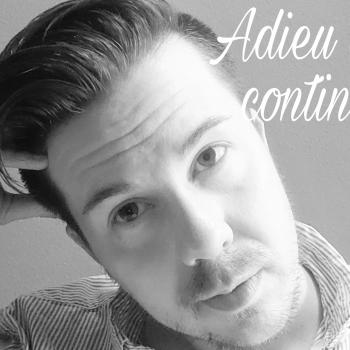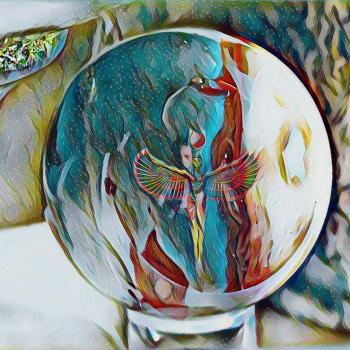One of the joys of social media is that it doesn’t always follow the short attention span of the 24/7 news cycle. If you follow someone who shares an article that’s a few months old, suddenly embers of an old debate can flare back up and shed a little light, heat, or both.
I keep a weather eye on Zen teacher Brad Warner‘s blog and Facebook page, because beside liking his writings I got to scope him out in person at Starwood a few years ago and determine that he’s not a cabbage but an actual human being. I don’t always agree with him, but I’m interested in what he has to say.
He recently linked to an months-old entry at the blog of Ron Crouch, an insight/Vipassana meditation teacher, regarding the blow-up between Ben Affleck and Sam Harris on Real Time with Bill Maher. Brad’s post ignited a long Facebook thread, and put me in mind of a few points about religion and identity that I think need to be addressed (and which also make for a good followup to our last episode).
But since Harris is a controversy magnet I want to say a few things about him first. Sam Harris is a smart guy, and we’re both atheists (after our own fashions) with an interest in mystical experiences and mediation and the martial arts. I think he and I could have some interesting discussions over a few drinks.
But in some ways Harris is deeply confused about how the world works, and that makes some of his political opinions dangerous. One of these points of confusion is the social nature of religion, and this is a confusion that Crouch seems to share — though not to the point of crossing the line into Islamophobia as Harris unfortunately does. I don’t get the impression that Crouch would claim that “We are at war with Islam” as Harris has.[Harris]
Anyway. Enough skirting of ad hominem. I’d like to address the claim that Crouch, in defense of Harris, makes about religion and identity. According to Crouch, all ideologies are “toxic beyond imagining”, in that they “hack” the normal and healthy formation of psychological identity:
One does not just think that it is true that Jesus is the son of the creator of the universe, one becomes a “Christian.” One does not merely think that Mohamed met with an angel, one becomes a “Muslim.” One does not just believe that the proletariate will eventually seize the means of production, one becomes a “Communist.” And in my own little corner of the world, one does not just believe that the Buddha discovered an exit from being born over and over again, had psychic powers or was omniscient, one becomes a “Buddhist.”
…
It is not overstating the case to say that if we used the same critical faculties to evaluate such claims that we use to choose car insurance, all superstitious and utopian ideologies would disappear in a day. But because these kinds of ideas disrupt the process of identity-formation, taking it over, we refrain from saying, or even thinking, the obvious to avoid offending others or frightening ourselves.[Crouch]
When I look at my own experience, though, this is not what I find.
Now you may be surprised to learn this, but I wasn’t born a Zen Pagan Taoist Atheist Discordian Transcendentalist. I was born into a Catholic household and raised Catholic, in the manner of my Polish and Irish immigrant great- and great-great-grandparents. (Though with a New Age twist — Dad had Edgar Cayce books on the shelf, and Mom believed she lived a past life in Atlantis. Have I mentioned I grew up in the 1970s?)
That Catholicism was a big part of my identity up until my teens or so. But I did not become a Catholic by intellectually considering and then accepting the doctrines of the Church. It was more the case that I learned to identify myself as a Catholic — not as a result of deliberate teaching and intellectual instruction, but in the same way that I learned to speak English and to root for the Orioles, through a process of imitation.

As I grew up I was taught that Catholics accepted a certain set of doctrines, and only later and vaguely was I taught some details of those doctrines. For a while I accepted those I found congenial and neglected those I did not. It was only when I was asked to make a formal acceptance of the whole shebang that, taking the prospect of Confirmation more seriously than my peers, I found it necessary to walk away, out to a space where I could start to think for myself.
In other words, the casual chain was exactly backwards from the story that Crouch is telling. I did not accept the proposition that the poor old carpenter-rabbi known to history as Jesus was the son of the creator of the universe and thus become a “Christian”; rather I became, through an almost osmotic process, a Christian and thus learned to nod at the accompanying doctrine. (For a few years, at least.)
“But you were just a child!” one may object. Well, yes, but that is how most people absorb their religion. Carl Sagan wrote that “Many people have inherited their religion like their eye color,”[Sagan p 339] and that really is an on-target analogy. But even when religion is not inherited that way, when there is a conversion, the cultural aspects of a religion usually come first, the dogma later.
Consider the famous conversion of Sammy Davis Jr. to Judaism.
He did not sit down with Huston Smith’s The World’s Religions and read up on the doctrines of various faiths and choose Judaism as a set of intellectual propositions. Instead he met a couple of rabbis who impressed him with their attitude toward life and their cultural customs. “Jews have become strong over their thousands of years of oppression and I wanted to become part of that strength….I wanted to become a Jew because the customs of Judaism held a cleanliness that no other philosophy on this earth can offer.”[Davis]
We might argue that it ought not be that way. Certainly some of us, through whatever combination of circumstance, have found ourselves distanced from our native cultures and without another one ready to grab on to; we were sufficiently alienated to step back and consider the matter intellectually. Those of us who have been though that process might consider it a superior way to form a relationship with religious practice, that everyone ought to do that.
But it is a dangerous confusion to base our politics on ought instead of is.
When people like Harris make arguments of the form
- People form their religious affiliation as a matter of selecting intellectual propositions.
- These people are Muslim (or Christian or Jewish or Hindu or…).
- Therefore we know that they wholeheartedly accept this set of propositions that define Islam (Christianity, Judaism, Hinduism…).
they have mistaken how most people experience religion, right at step 1, confusing how people ought to form their religious affiliation and personal identities with how they in fact do so.
And when people call for armed conflict on the basis of such mistaken reasoning, it’s nothing less than tragic.
Crouch suggests that if we applied critical thinking to religion the same way we apply it to consumer choices, supernaturalism would quickly fall. But I think he is mistaken in believing that critical thinking plays much of a role in our consumer choices! If it did, surely all the money and energy put into the black magic of advertising would be a waste. Critically thinking profit-oriented companies would stop useless appeals to emotion and culture in favor of intellectual arguments about the suitability of their products for various applications.
But the “rational consumer” is a mostly a myth found in economic theories divorced from reality. People don’t shop like that.
And they don’t worship like that either — the “rational adherent” is a character in sociological theories that aren’t reality based.
References
Crouch, Ron. “In Defense of Sam Harris, Sacred Cow Butcher”. Aloha Dharma. 28 Oct 2014. http://alohadharma.com/2014/10/28/in-defense-of-sam-harris-sacred-cow-butcher/
Davis, Sammy, Jr. “Why I Became A Jew.” Ebony Feb 1960. http://books.google.com/books?id=F9umweXiDtgC&lpg=PA1&pg=PA62
Harris, Sam. “Mired in a religious war.” Washington Times 1 Dec 2004. http://www.washingtontimes.com/news/2004/dec/1/20041201-090801-2582r/
Sagan, Carl. Sagan, Carl. Broca’s Brain. New York: Ballantine Books, 1980.
“The Zen Pagan” appears every other Friday. You can keep up by subscribing via RSS or e-mail.
I’ll be presenting at PantheaCon, February 13-16 at the San Jose Doubletree Hotel — if you’re there, say hello.
If you do Facebook, you might choose to join a group on “Zen Paganism” I’ve set up there. And don’t forget to “like” Patheos Pagan over there, too.

















